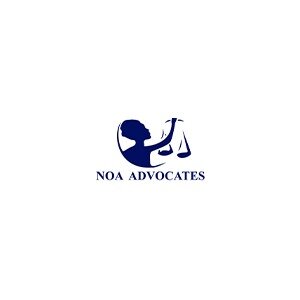Best Art & Cultural Property Law Lawyers in Bujumbura
Share your needs with us, get contacted by law firms.
Free. Takes 2 min.
List of the best lawyers in Bujumbura, Burundi
About Art & Cultural Property Law in Bujumbura, Burundi
Art & Cultural Property Law in Bujumbura, Burundi, focuses on the protection, preservation, and governance of the country’s rich cultural heritage. This area of law deals with issues related to ownership, transfer, and protection of cultural and artistic assets. Given Burundi's history and diverse culture, these laws play a crucial role in safeguarding cultural artifacts, artworks, traditional crafts, and historical sites from illegal exploitation and ensure that cultural properties are used in a manner respectful to the local community and national identity.
Why You May Need a Lawyer
Several situations may necessitate the expertise of a legal professional specializing in Art & Cultural Property Law. This includes disputes over the ownership of artworks or cultural artifacts, the illegal import or export of cultural goods, and the protection of intellectual property rights related to artistic works. Additionally, private collectors, museums, and galleries might require legal guidance to ensure compliance with local regulations. Legal advice can also be critical in navigating repatriation claims, negotiating the acquisition or sale of culturally significant items, and ensuring lawful excavation or restoration activities.
Local Laws Overview
In Bujumbura, key aspects of Art & Cultural Property Law are shaped by national legislation focusing on the protection of cultural heritage and property. The legal framework may include laws concerning the registration of cultural artifacts, licensing requirements for excavation or export of cultural property, and legal recourses available for unauthorized handling of such properties. Furthermore, the government has guidelines for the public and private sectors, ensuring ethical standards in the acquisition and display of cultural goods, encouraging the documentation and proper registration of artworks, and protecting indigenous crafts and cultural expressions.
Frequently Asked Questions
1. What is considered cultural property in Burundi?
Cultural property includes artifacts, artworks, and sites that are of archaeological, historical, or cultural significance to Burundi and its heritage.
2. Do I need a permit for trading in cultural artifacts?
Yes, engaging in the trade of cultural artifacts typically requires permits to ensure compliance with national and international regulations.
3. How is intellectual property protected under the Art & Cultural Property Law?
Intellectual property related to artworks is protected through copyright laws, providing artists rights over their creative works.
4. Can cultural property be exported from Burundi?
Exporting cultural property requires permissions and must adhere to national regulations to prevent illicit trade and loss of heritage.
5. What legal responsibilities do museums have?
Museums must comply with regulations regarding the acquisition, registration, and exhibition of cultural objects, ensuring the ethical management of their collections.
6. How are disputes over cultural property resolved?
Disputes can be resolved through mediation, arbitration, or legal proceedings in local courts, depending on the nature and complexity of the issue.
7. Are there laws protecting traditional craftsmanship?
Yes, laws exist to protect traditional craftsmanship as part of Burundi’s cultural heritage, ensuring their preservation and respect for creators.
8. Is there a limitation period for reclaiming stolen cultural property?
The limitation period can vary, so it's crucial to consult a legal expert to understand specific circumstances surrounding a claim.
9. How can I ensure the authenticity of cultural goods?
You can consult experts, check provenance documentation, and seek guidance from legal professionals specializing in art law.
10. What should I do if I suspect a violation of cultural property laws?
Report the suspected violation to relevant local authorities and seek legal advice to assist with proper procedures and actions.
Additional Resources
For those seeking further assistance or information, it may be helpful to connect with governmental bodies such as the Ministry of Culture or local cultural heritage preservation associations. Additionally, the International Council of Museums (ICOM) provides guidance on the ethical management of cultural properties. Legal associations specializing in cultural heritage law can also be valuable resources for expert advice.
Next Steps
If you need legal assistance in Art & Cultural Property Law, consider consulting a lawyer with expertise in cultural heritage legislation. Prepare relevant documentation, such as ownership records or permits, and schedule a consultation to discuss your specific needs. Being proactive and informed can significantly aid in resolving issues related to art and cultural property in Bujumbura, Burundi.
Lawzana helps you find the best lawyers and law firms in Bujumbura through a curated and pre-screened list of qualified legal professionals. Our platform offers rankings and detailed profiles of attorneys and law firms, allowing you to compare based on practice areas, including Art & Cultural Property Law, experience, and client feedback.
Each profile includes a description of the firm's areas of practice, client reviews, team members and partners, year of establishment, spoken languages, office locations, contact information, social media presence, and any published articles or resources. Most firms on our platform speak English and are experienced in both local and international legal matters.
Get a quote from top-rated law firms in Bujumbura, Burundi — quickly, securely, and without unnecessary hassle.
Disclaimer:
The information provided on this page is for general informational purposes only and does not constitute legal advice. While we strive to ensure the accuracy and relevance of the content, legal information may change over time, and interpretations of the law can vary. You should always consult with a qualified legal professional for advice specific to your situation.
We disclaim all liability for actions taken or not taken based on the content of this page. If you believe any information is incorrect or outdated, please contact us, and we will review and update it where appropriate.











